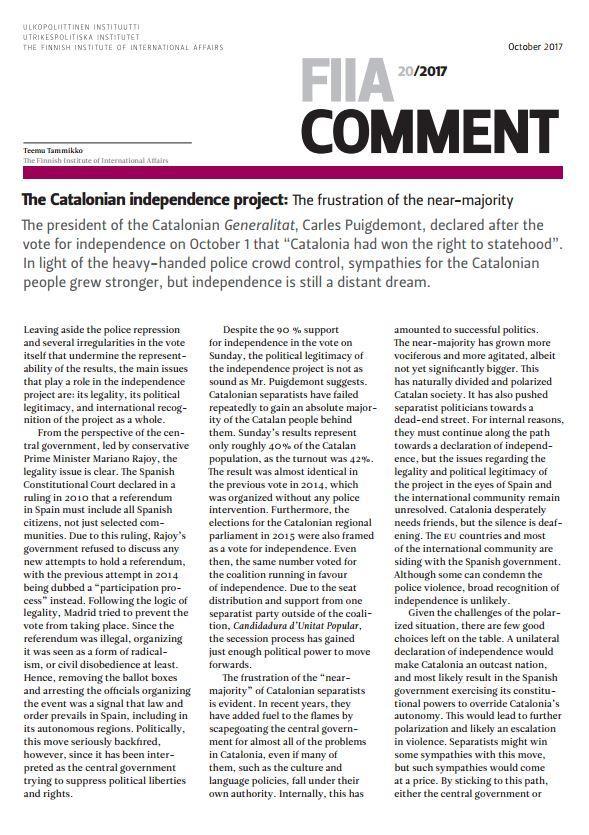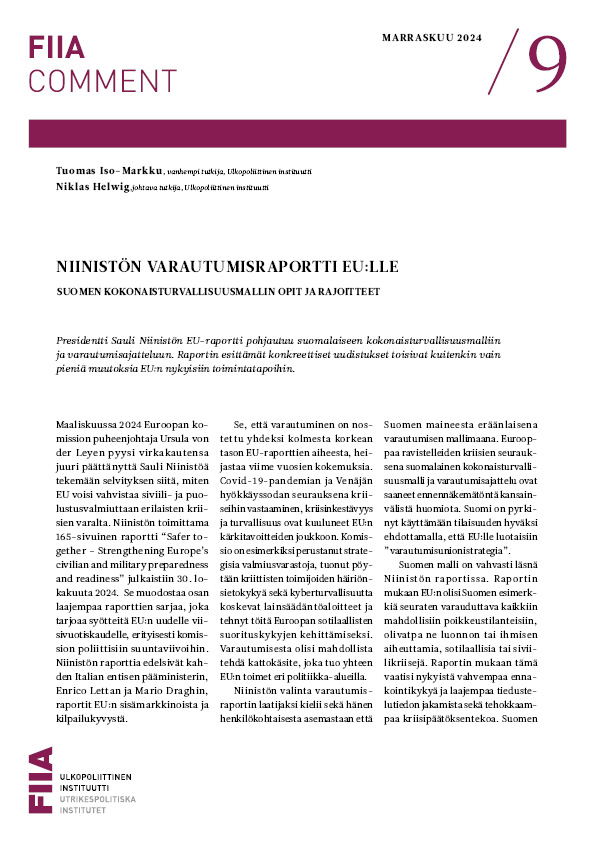The president of the Catalonian Generalitat, Carles Puigdemont, declared after the vote for independence on October 1 that “Catalonia had won the right to statehood”. In light of the heavy-handed police crowd control, sympathies for the Catalonian people grew stronger, but independence is still a distant dream.
Leaving aside the police repression and several irregularities in the vote itself that undermine the representability of the results, the main issues that play a role in the independence project are: its legality, its political legitimacy, and international recognition of the project as a whole.
From the perspective of the central government, led by conservative Prime Minister Mariano Rajoy, the legality issue is clear. The Spanish Constitutional Court declared in a ruling in 2010 that a referendum in Spain must include all Spanish citizens, not just selected communities. Due to this ruling, Rajoy’s government refused to discuss any new attempts to hold a referendum, with the previous attempt in 2014 being dubbed a “participation process” instead. Following the logic of legality, Madrid tried to prevent the vote from taking place. Since the referendum was illegal, organizing it was seen as a form of radicalism, or civil disobedience at least. Hence, removing the ballot boxes and arresting the officials organizing the event was a signal that law and order prevails in Spain, including in its autonomous regions. Politically, this move seriously backfired, however, since it has been interpreted as the central government trying to suppress political liberties and rights.
Despite the 90 % support for independence in the vote on Sunday, the political legitimacy of the independence project is not as sound as Mr. Puigdemont suggests. Catalonian separatists have failed repeatedly to gain an absolute majority of the Catalan people behind them. Sunday’s results represent only roughly 40% of the Catalan population, as the turnout was 42%. The result was almost identical in the previous vote in 2014, which was organized without any police intervention. Furthermore, the elections for the Catalonian regional parliament in 2015 were also framed as a vote for independence. Even then, the same number voted for the coalition running in favour of independence. Due to the seat distribution and support from one separatist party outside of the coalition, Candidadura d’Unitat Popular, the secession process has gained just enough political power to move forwards.
The frustration of the “near-majority” of Catalonian separatists is evident. In recent years, they have added fuel to the flames by scapegoating the central government for almost all of the problems in Catalonia, even if many of them, such as the culture and language policies, fall under their own authority. Internally, this has amounted to successful politics. The near-majority has grown more vociferous and more agitated, albeit not yet significantly bigger. This has naturally divided and polarized Catalan society. It has also pushed separatist politicians towards a dead-end street. For internal reasons, they must continue along the path towards a declaration of independence, but the issues regarding the legality and political legitimacy of the project in the eyes of Spain and the international community remain unresolved. Catalonia desperately needs friends, but the silence is deafening. The EU countries and most of the international community are siding with the Spanish government. Although some can condemn the police violence, broad recognition of independence is unlikely.
Given the challenges of the polarized situation, there are few good choices left on the table. A unilateral declaration of independence would make Catalonia an outcast nation, and most likely result in the Spanish government exercising its constitutional powers to override Catalonia’s autonomy. This would lead to further polarization and likely an escalation in violence. Separatists might win some sympathies with this move, but such sympathies would come at a price. By sticking to this path, either the central government or the Catalonian regional government could fall.
Catalonia has asked the EU to step in to mediate the dispute between Madrid and Barcelona. This is a viable option, but only if Madrid agrees to it. Given the current government, this is not likely to happen. Undoubtedly, the EU will be forced to discuss its role regarding this kind of internal challenge to a member state, but any major changes in the EU’s or its member states’ positions are not anticipated.
The big question is how to bring the opposing sides to the same negotiation table. The Spanish government would surely want a guarantee that independence will not be declared, and that Catalonia demonstrates that it will respect the Spanish constitution and the rule of law – which are, in the end, also the foundations of Catalonia. Madrid will not bend before demonstrations and threats. On the other hand, Catalonia needs something to appease the agitated independence supporters. New models of financing the autonomous region, such as fiscal rights à la the Basque Country, is something to start with. However, making compromises has not been the strength of either side so far.
In the longer run, the question of a properly organized and binding vote on independence must be on the table. For the Catalonians, this is the only way that the independence project can achieve political legitimacy and possible international recognition. For the central government, this would be the way to demonstrate to the international community that it is not only on a solid legal footing, but also on firm ground politically and morally. However, the stakes would be high in an “all- in” vote. Neither side can win with a substantial margin, which will surely frustrate the losing side. Hence the conditions for the referendum and its consequence should be clear and agreed upon beforehand, not only in Catalonia, but in the rest of Spain.








